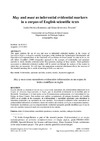Please use this identifier to cite or link to this item:
https://accedacris.ulpgc.es/jspui/handle/10553/59980
| DC Field | Value | Language |
|---|---|---|
| dc.contributor.author | Ortega Barrera, Ivalla | en_US |
| dc.contributor.author | Quintana Toledo, Elena | en_US |
| dc.date.accessioned | 2019-12-20T16:44:19Z | - |
| dc.date.available | 2019-12-20T16:44:19Z | - |
| dc.date.issued | 2013 | en_US |
| dc.identifier.issn | 1133-0392 | en_US |
| dc.identifier.other | Dialnet | - |
| dc.description.abstract | En este artículo se examina el uso de may y must como marcadores de evidencialidad inferencial en el Corpus de Artículos Especializados en Inglés, que se desarrolla actualmente en el Instituto para el Desarrollo Tecnológico y la Innovación en las Comunicaciones perteneciente a la Universidad de Las Palmas de Gran Canaria. Para realizar este análisis secundaremos el enfoque disyuntivo de Cornillie (2009) en el estudio de los conceptos de evidencialidad y modalidad epistémica para identificar la naturaleza evidencial y no epistémica de estos modales. Su evaluación cualitativa como marcadores de evidencialidad inferencial se realizará a través del análisis del contexto en el que se encuentran inmersos. Finalmente mostraremos que un enriquecimiento contextual apropiado permite identificar que el uso de estos dos modales marcan el modo de conocimiento de los autores | en_US |
| dc.description.abstract | This paper explores the use of may and must as inferential evidential markers in the Corpus of Specialized Papers in English, currently in progress at the Institute for Technological Development and Innovation in Communications at the University of Las Palmas de Gran Canaria. In order to do so, we will follow Cornillie's (2009) disjunctive approach to the concepts of evidentiality and epistemic modality to firstly identify evidential rather than epistemic readings of these modals. Their qualitative assessment as inferential evidential markers will be carried out through the analysis of the context in which they are immersed. We will show that appropriate contextual enrichment allows the recovery of the intended meaning, that is, mode of knowing, of both may and must | en_US |
| dc.language | eng | en_US |
| dc.relation.ispartof | Estudios ingleses de la Universidad Complutense | en_US |
| dc.source | Estudios ingleses de la Universidad Complutense [ISSN 1133-0392] (21), p. 11-29 | en_US |
| dc.subject | 57 Lingüística | en_US |
| dc.subject.other | Evidentiality | en_US |
| dc.subject.other | Epistemic modality | en_US |
| dc.subject.other | Context | en_US |
| dc.subject.other | Modals | en_US |
| dc.subject.other | Disjunctive approach | en_US |
| dc.subject.other | Evidencialidad | en_US |
| dc.subject.other | Modalidad epistémica | en_US |
| dc.subject.other | Contexto | en_US |
| dc.subject.other | Modales | en_US |
| dc.subject.other | Enfoque disyuntivo | en_US |
| dc.title | "May" and "must" as inferential evidential markers in a corpus of English scientific texts | en_US |
| dc.title.alternative | May y must como marcadores evidenciales inferenciales en un corpus de textos científicos en inglés | en_US |
| dc.type | info:eu-repo/semantics/article | en_US |
| dc.type | Article | en_US |
| dc.identifier.doi | 10.5209/rev_EIUC.2013.v21.43271 | en_US |
| dc.identifier.url | http://dialnet.unirioja.es/servlet/articulo?codigo=4614827 | - |
| dc.description.lastpage | 29 | en_US |
| dc.identifier.issue | 21 | - |
| dc.description.firstpage | 11 | en_US |
| dc.investigacion | Artes y Humanidades | en_US |
| dc.type2 | Artículo | en_US |
| dc.contributor.authordialnetid | 2562123 | - |
| dc.identifier.dialnet | 4614827ARTREV | - |
| dc.utils.revision | Sí | en_US |
| dc.identifier.ulpgc | Sí | en_US |
| dc.contributor.buulpgc | BU-HUM | en_US |
| dc.description.dialnetimpact | 0,0 | |
| dc.description.dialnetq | Q4 | |
| dc.description.erihplus | ERIH PLUS | - |
| item.grantfulltext | open | - |
| item.fulltext | Con texto completo | - |
| crisitem.author.dept | GIR Discourse, Communication and Society | - |
| crisitem.author.dept | Departamento de Filología Moderna, Traducción e Interpretación | - |
| crisitem.author.dept | GIR Discourse, Communication and Society | - |
| crisitem.author.dept | Departamento de Filología Moderna, Traducción e Interpretación | - |
| crisitem.author.orcid | 0000-0003-2155-9092 | - |
| crisitem.author.orcid | 0000-0002-1583-808X | - |
| crisitem.author.parentorg | Departamento de Filología Moderna, Traducción e Interpretación | - |
| crisitem.author.parentorg | Departamento de Filología Moderna, Traducción e Interpretación | - |
| crisitem.author.fullName | Ortega Barrera, María Ivalla | - |
| crisitem.author.fullName | Quintana Toledo, Elena | - |
| Appears in Collections: | Artículos | |
Page view(s)
242
checked on Jan 15, 2026
Download(s)
102
checked on Jan 15, 2026
Google ScholarTM
Check
Altmetric
Share
Export metadata
Items in accedaCRIS are protected by copyright, with all rights reserved, unless otherwise indicated.
